Slight Drop in Bachelor’s Degree Awards to African Americans
According to the U.S. Department of Education, in the year 2004 blacks earned 131,241 four-year bachelor’s degrees from American colleges and universities. The number of blacks earning bachelor’s degrees in 2004 was the highest in this nation’s history. But in 2005 blacks earned only 127,844 bachelor’s degrees, down 2.6 percent from the previous year.
Even more discouraging is the fact that the percentage of all bachelor’s degrees won by blacks dropped from 9.4 percent in 2004 to 8.9 percent in 2005.
It is hoped that the 2005 figures are a one time statistical anomaly as the overall progress in black bachelor’s degree attainments has been steady over the past two decades. Since 1990 the number of blacks earning bachelor’s degrees has more than doubled. Since the year 2000 black bachelor’s degree awards have increased by 18 percent.
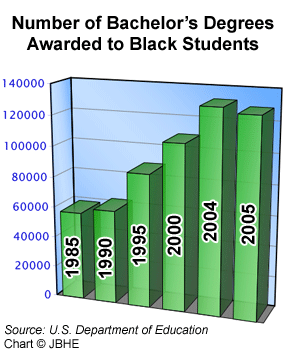
  |
“I became so frustrated with visiting inner-city schools that I just stopped going. The sense that you need to learn is just not there. If you ask the kids what they want or need, they will say an iPod or some sneakers. In South Africa, they don’t ask for money or toys. They ask for uniforms so they can go to school.”
— Oprah Winfrey, explaining her decision to spend $40 million to build a school in South Africa, in Newsweek, January 8, 2007
|
Education Department Official Challenges the American Bar Association’s Stance on Racial Diversity
 The general counsel of the U.S. Department of Education is challenging the American Bar Association’s initiative calling on U.S. law schools to take “concrete action” to increase racial and ethnic diversity on their campuses. The Department’s legal staff charges that the ABA requirements would oblige law schools in states which have banned affirmative action in admissions and hiring to break the law. The general counsel of the U.S. Department of Education is challenging the American Bar Association’s initiative calling on U.S. law schools to take “concrete action” to increase racial and ethnic diversity on their campuses. The Department’s legal staff charges that the ABA requirements would oblige law schools in states which have banned affirmative action in admissions and hiring to break the law.
In making its case the Education Department says, “The ABA is now requiring schools to implement quotas for enrollment and hiring of racial and ethnic minorities and women. While the agency says that its standard and its interpretations do not require quotas or preferences, the language is so vague that they can be reasonably read to require just that.”
If Secretary of Education Margaret Spellings agrees, she could force the ABA to abandon or revise its position or risk losing its authority as the accrediting agency for U.S. law schools.
Can this be another example of GOP efforts to put a stick in the eyes of black voters while winning, or reinforcing, voter support among racist whites?
Paul Quinn College Celebrates 135th Anniversary With New Fundraising Campaign
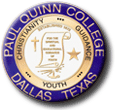 To celebrate the 135th anniversary of its founding, Paul Quinn College, the historically black educational institution in Dallas, is mounting a new fundraising campaign. Campaign 135 seeks to enlist the support of 135 corporations and civic organizations which in term will solicit 135 employees or members to participate in the campaign. Each participant will be asked to donate $1 a day for 135 days. To celebrate the 135th anniversary of its founding, Paul Quinn College, the historically black educational institution in Dallas, is mounting a new fundraising campaign. Campaign 135 seeks to enlist the support of 135 corporations and civic organizations which in term will solicit 135 employees or members to participate in the campaign. Each participant will be asked to donate $1 a day for 135 days.
If successful the campaign will raise $2.4 million for Paul Quinn College. The college hopes to renew the effort each year.

University of Akron
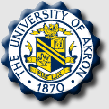
Department of Civil Engineering,
Two Tenure-track Faculty Positions in Structural Mechanics
The Department of Civil Engineering at The University of Akron invites applications for two tenure-track positions at the assistant/associate professor level in the area of Structural Engineering. Applicants should possess an earned doctorate degree in civil engineering or closely related discipline. Salary will be commensurate with qualifications and experience. We seek individuals with strong backgrounds and interests in one or more of the following areas:
1. Infrastructures, design, maintenance, and construction-related materials,
2. Structural health monitoring and prognosis,
3. Testing of advanced and smart structures,
4. Static and dynamic experimental characterization of materials at different scales (including nano- and microlevels), and the metallurgy of advanced metals and alloys.
The successful candidate will be expected to be a team player demonstrating interest in departmental collegiality, developing a strong externally funded research program, and demonstrate effectiveness in teaching undergraduate and graduate courses in the areas of structures, mechanics, and engineering materials and testing. In particular, the candidate should be able to fulfill the departmental mission of instruction by teaching one or more of the following undergraduate courses:
(1) Reinforced Concrete Design
(2) Engineering Materials Lab
(3) Advanced Structural Design
(4) Senior Design in Civil Engineering
(5) Construction related courses
The department offers BS and MS degrees in civil engineering and an interdisciplinary PhD degree. The Department of Civil Engineering has recently experienced an increase in student enrollment; currently there are 220 undergraduate and 50 graduate students. Several CE faculty contribute to, lead or are actively developing several centers of excellence including Advanced Large Structures Testing Lab, Defense Materials Technology Center, University Transportation Center, and Dynamic and Impact Lab. The department seeks to significantly increase the level of research and graduate student enrollment while maintaining its high standards of teaching and mentoring of undergraduate and graduate students.
Send a letter of application, curriculum vitae, statement of teaching philosophy, statement of research plans including areas in which the candidate has an interest in collaborating with other faculty, and names and telephone numbers of three references to Professor A.F. Saleeb, Chair, Search Committee, The University of Akron, Civil Engineering Department, Akron, OH 44325-3905 (electronic applications are welcomed to be mailed to CE administrative office using kstone@uakron.edu). Postmark deadline February 15, 2007. Applications will be reviewed beginning March 15, 2007 and will continue until the position is filled. The appointment is to start August 25, 2007.
The University of Akron is committed to a policy of equal employment opportunity and to the principles of affirmative action in accordance with state and federal laws.

No Blacks on the Short List for Harvard’s Presidency
 In late fall a list of 30 candidates for president of Harvard University was leaked to the press. Included on that list were two African Americans: Ruth Simmons, president of Brown University, and Shirley A. Jackson, president of Rensselaer Polytechnic Institute in Troy, New York. In late fall a list of 30 candidates for president of Harvard University was leaked to the press. Included on that list were two African Americans: Ruth Simmons, president of Brown University, and Shirley A. Jackson, president of Rensselaer Polytechnic Institute in Troy, New York.
JBHE suspects that the long list was released for window dressing purposes to demonstrate that the university was casting a wide and diversified net in seeking its new president.
Now the Boston Globe reports that the short list for the president’s position includes four individuals: Elena Kagan, dean of Harvard Law School, Drew Gilpin Faust, dean of the Radcliffe Institute for Advanced Study, Steven E. Hyman, provost at Harvard, and Thomas R. Cech, president of the Howard Hughes Medical Institute.
As expected, Harvard will not have a new president who is African American.
University of Louisville Announces New Financial Aid Program for Low-Income Students
 The University of Louisville, a state-operated university in Kentucky, has announced the Cardinal Covenant program for low-income students. The program will supplement federal financial aid by providing scholarship grants for any remaining unmet need to cover full tuition and room and board costs for all in-state students whose family income is below 150 percent of the federal poverty level. The Cardinal Covenant will also provide a book allowance. The University of Louisville, a state-operated university in Kentucky, has announced the Cardinal Covenant program for low-income students. The program will supplement federal financial aid by providing scholarship grants for any remaining unmet need to cover full tuition and room and board costs for all in-state students whose family income is below 150 percent of the federal poverty level. The Cardinal Covenant will also provide a book allowance.
Under the program, students will receive funds if they qualify for federal Pell Grants, are enrolled full-time, maintain satisfactory grades, and graduate within five years.
About 22.6 percent of all families in Kentucky have income below 150 percent of the federal poverty level. The university estimates that about 150 students will qualify for the program this coming fall. Blacks make up 13 percent of the 15,000 undergraduates at the University of Louisville.
Black College’s Former President Sentenced in Loan Fraud Case
Dolores E. Cross, who served as president of historically black Morris Brown College in Atlanta from 1998 to 2002, has been sentenced to five years of probation and one year of home confinement for her role in a scheme to defraud the federal student loan program. Cross pleaded guilty to embezzlement in the case in return for the government dropping 27 other charges against her.
The government claimed that Cross and some associates obtained $3.4 million from the college in student loans and Pell Grants for 1,800 ineligible students, many of whom never enrolled at the institution.
Cross is now 70 years old.
Black Enrollments in Law School Continue to Slide
In the 2005-06 academic year there were 9,195 black students attending the 190 U.S. law schools accredited by the American Bar Association. While enrollments of all races were up slightly from the previous year, total black law school enrollments decreased by 3 percent. As a result, blacks now make up 6.2 percent of all law school enrollments. In the year 2000, blacks were 7.1 percent of all law school enrollments.
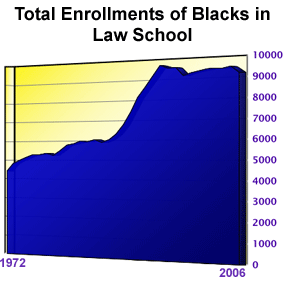

Yale’s Surprise Decision to Keep Early Admissions May Undercut Efforts of Other Ivies to Recruit Highly Qualified Blacks and Low-Income Whites
 In a surprise announcement early in 2007, President Richard C. Levin said that Yale University would continue its nonbinding early admissions program. Last fall both Harvard and Princeton ended their early admissions programs. In a surprise announcement early in 2007, President Richard C. Levin said that Yale University would continue its nonbinding early admissions program. Last fall both Harvard and Princeton ended their early admissions programs.
How will the Yale decision affect the application process for black students interested in an Ivy League education? It is likely that Yale will benefit by receiving large numbers of early black applicants who previously may have preferred Princeton or Harvard.
 Many black students, like whites, prefer to avoid the stress of the college application process by locking up a place at a prestigious institution early in their senior year of high school. A black student who applies to the nonbinding early admissions program at Yale and is notified that he or she is admitted in early December is unlikely to spend additional time filling out college applications, writing essays, and spending application fees for Harvard, Princeton, and other universities with a single admissions pool that has an application deadline of January 1. Many black students, like whites, prefer to avoid the stress of the college application process by locking up a place at a prestigious institution early in their senior year of high school. A black student who applies to the nonbinding early admissions program at Yale and is notified that he or she is admitted in early December is unlikely to spend additional time filling out college applications, writing essays, and spending application fees for Harvard, Princeton, and other universities with a single admissions pool that has an application deadline of January 1.
Yale’s action is believed to give it an advantage in recruiting highly qualified black students.
For a more detailed analysis of how Yale’s decision on early admissions will affect black students, click here.
Appointment
 • Ivory V. Nelson, president of Lincoln University in Pennsylvania, was appointed by President Bush to serve on the President’s Board of Advisors for Historically Black Colleges and Universities. The 18-member board meets four times a year in Washington, D.C. • Ivory V. Nelson, president of Lincoln University in Pennsylvania, was appointed by President Bush to serve on the President’s Board of Advisors for Historically Black Colleges and Universities. The 18-member board meets four times a year in Washington, D.C.
|
The Black Colleges With the Lowest Graduation Rates for African-American Students
Sadly, there are only seven historically black colleges and universities in the United States that graduate at least one half of the students who matriculate at these schools. They are: Spelman College, Howard University, Fisk University, Hampton University, Miles College, Morehouse College, and Elizabeth City State University in North Carolina.
Here is the worst news of all: At 20 HBCUs, two thirds or more of all entering black students do not go on to earn a diploma. The lowest graduation rate was at the University of the District of Columbia, where only 8 percent of entering freshmen go on to earn a bachelor’s degree. At Texas Southern University in Houston, 15 percent of entering students complete college. At LeMoyne-Owen College in Memphis, the black student graduation rate is 14 percent.
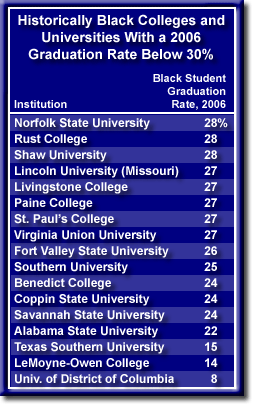
African Scholars Teaching at U.S. Colleges and Universities
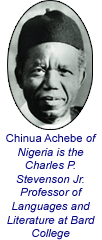 In the 2005-06 academic year, there were 96,981 foreign scholars teaching at American colleges and universities. The number of foreign scholars was up 8.2 percent from the previous year. More than 80 percent of these foreign scholars are from either Europe or Asia. Only 2,421, or 2.5 percent, are from Africa. The number of African scholars teaching at American colleges and universities was up 3.6 percent from a year earlier. In the 2005-06 academic year, there were 96,981 foreign scholars teaching at American colleges and universities. The number of foreign scholars was up 8.2 percent from the previous year. More than 80 percent of these foreign scholars are from either Europe or Asia. Only 2,421, or 2.5 percent, are from Africa. The number of African scholars teaching at American colleges and universities was up 3.6 percent from a year earlier.
Nearly one third of the African scholars teaching in the United States are from the Arab nations of North Africa. Today there are about 1,600 scholars from black African nations currently teaching at U.S. colleges and universities. Scholars from 40 black African nations taught at U.S. colleges and universities during the 2005-06 academic year. South Africa sent 304 scholars to teach in the U.S., more than any other black African nation. But it is not known how many of these South African scholars teaching in the U.S. are white.
Among other black African nations, Nigeria sent 265 scholars to teach in the United States. Kenya, Ghana, Ethiopia, Cameroon, Zimbabwe, Senegal, and Tanzania were the only other black African nations to send as many as 50 scholars to teach at American universities.
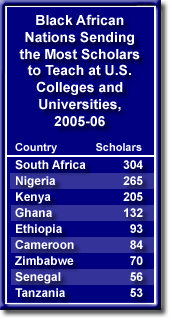
Hampton Students Establish Nonprofit Organization to Help Homeless Teens
 Dominique Steele and Steve Young, two students at the historically black Hampton University in Virginia, have established Project: Dream Big, a nonprofit organization seeking to help homeless youth in the area. The organization goes to city shelters and offers tutoring, mentoring, and music lessons to homeless youths between the ages of 4 and 17. In addition, the organization holds a monthly seminar for the benefit of homeless teens who want to enroll in college. Dominique Steele and Steve Young, two students at the historically black Hampton University in Virginia, have established Project: Dream Big, a nonprofit organization seeking to help homeless youth in the area. The organization goes to city shelters and offers tutoring, mentoring, and music lessons to homeless youths between the ages of 4 and 17. In addition, the organization holds a monthly seminar for the benefit of homeless teens who want to enroll in college.
About 75 college students currently volunteer their time to Project: Dream Big. The organization has been able to scrape by with some small grants and donations from corporations and individuals. The nonprofit’s executive board hopes to secure federal funding for the effort.
Well-Known Black Scholars Who Get High Marks From Their Students
 RateMyProfessors.com is an irreverent Internet site that enables college students to post comments about their teachers. Online since 1999, RateMyProfessors now has posted more than 6.3 million ratings for more than 770,000 professors at 6,000 different institutions of higher education. RateMyProfessors.com is an irreverent Internet site that enables college students to post comments about their teachers. Online since 1999, RateMyProfessors now has posted more than 6.3 million ratings for more than 770,000 professors at 6,000 different institutions of higher education.
Students are asked to rate their professors’ clarity and helpfulness on a scale of 1 to 5 with 5 being the highest rating for each professor. These scores are averaged to produce an overall quality rating.
JBHE checked the ratings at the Web site for all the well-known black scholars we routinely measure each year for academic citation counts, press mentions, and references in various Google and Amazon.com search engines. Of the dozens of black scholars for whom we found ratings at the site, only four professors received perfect overall quality scores. They are:
- Clayborne Carson, professor of history at Stanford
- Manning Marable, professor of history at Columbia University
- Michael Eric Dyson, professor of the humanities at the University of Pennsylvania
- Sylvester James Gates Jr., professor of physics at the University of Maryland
University of Michigan Now Admitting Students on a Race Neutral Basis
 In November voters in Michigan overwhelmingly approved Proposal 2, a public referendum which banned the use of race in university admissions. After the vote, the University of Michigan sought a delay in the implementation of the measure until after it completed the current admissions cycle. The university suspended its admissions decisions until the courts ruled on this request. That delay, initially approved by a federal district court, has been overturned on appeal. The university has now resumed admissions on a race neutral basis while continuing to examine its legal options to fight the restrictive measure in court. In November voters in Michigan overwhelmingly approved Proposal 2, a public referendum which banned the use of race in university admissions. After the vote, the University of Michigan sought a delay in the implementation of the measure until after it completed the current admissions cycle. The university suspended its admissions decisions until the courts ruled on this request. That delay, initially approved by a federal district court, has been overturned on appeal. The university has now resumed admissions on a race neutral basis while continuing to examine its legal options to fight the restrictive measure in court.
The Graying of American Faculty Is Bad News for Blacks
 According to a new survey by the Higher Education Research Institute at the University of California at Los Angeles, tenured professors are holding on to their positions on college and university faculties longer than has been the case in the past. Many of the scholars who stay on past age 70 are scientists and they do so in order to maintain full access to research facilities. According to a new survey by the Higher Education Research Institute at the University of California at Los Angeles, tenured professors are holding on to their positions on college and university faculties longer than has been the case in the past. Many of the scholars who stay on past age 70 are scientists and they do so in order to maintain full access to research facilities.
Nationwide, 2.1 percent of all full-time faculty members are over the age of 70. But at some of the nation’s most prestigious universities, an even greater percentage of the tenured professors have passed the standard retirement age. For example, in 1992 none of the tenured professors in the College of Arts and Sciences at Harvard College were over the age of 70. Today, nearly 10 percent of the tenured professors at Harvard are over the age of 70. Harvard now has 186 tenured professors over the age of 60 and 156 under the age of 50.
At MIT nearly 6 percent of the tenured faculty is over 70. In 1994 less than 1 percent of all tenured faculty was older than 70.
This graying of college and university faculty is bad news for blacks. Because these long-time professors, the vast majority of whom are white males, are declining to give up their faculty positions, there are fewer opportunities for younger faculty, a far more racially diverse group, to gain tenured positions.
Today, blacks are about 5 percent of all full-time faculty in American higher education. JBHE research has shown that at the current rate of progress, it would take more than a century for racial parity in faculty positions to be achieved. The large numbers of older, predominantly white, tenured faculty makes progress toward racial equality more difficult to achieve.
  |
1.9% Percentage of all white adults over the age of 35 who were enrolled in school in 2004.
3.3% Percentage of all African-American adults over the age of 35 who were enrolled in school in 2004.
source: U.S. Bureau of the Census
|
The Emergence of Black Studies at the University of California at San Diego
 The University of California at San Diego is generally considered the third most selective campus of the University of California system behind Berkeley and UCLA. Blacks are a mere 1.3 percent of the 20,000-member undergraduate student body at the institution. The University of California at San Diego is generally considered the third most selective campus of the University of California system behind Berkeley and UCLA. Blacks are a mere 1.3 percent of the 20,000-member undergraduate student body at the institution.
In an attempt to increase racial diversity on campus, this past semester the university began its African-American studies minor program. Students who enroll in the minor program will take courses in African-American history, politics, and culture. It is hoped that as the program becomes more established it will attract more black students and black faculty to the university. Cultural events organized by the new program will also increase the diversity of offerings on campus.
Organizers of the effort hope black studies will one day become a bachelor’s degree program and achieve departmental status at the university.

University of Kentucky Medical Center

Endowed Professorship in Physiology Education, Department of Physiology
We seek an established authority in biomedical education to fill the newly endowed Donald T. Frazier Professorship in Physiology. Applicants must have a Ph.D., M.D. or equivalent degree, a strong record of accomplishment in medical or science education, and extramural funding in educational, basic, or translational research. This is a tenured or tenure-track faculty position at a rank appropriate to the applicant’s career stage. The successful candidate will promote existing programs in professional, graduate, and undergraduate education and in science outreach and will stimulate innovative new initiatives to enhance our educational mission. We are particularly interested in applications from women, minorities, and people with disabilities.
Qualified individuals are encouraged to forward a curriculum vita, a concise statement of educational philosophy and research interests, and the names of three references to:
Ms. Bonnie Emerich
Department of Physiology
University of Kentucky Medical Center
800 Rose Street, Room MS-508
Lexington, KY 40536-0298
The University of Kentucky is an Affirmative Action/Equal Opportunity Employer.

Facing Criticism Over Its Commitment to Racial Diversity, the American Economic Association Changes Policy on Job Postings
 Three weeks ago the JBHE Weekly Bulletin reported that the American Economic Association deleted the following statement from a job posting submitted for display on the AEA Web site: “The university welcomes applications from women and underrepresented ethnic, racial, and cultural groups and from people with disabilities.” The AEA stated that it would publish notices that say a university is an equal opportunity employer or favors diversity. But it would not allow the mention of any particular group. Three weeks ago the JBHE Weekly Bulletin reported that the American Economic Association deleted the following statement from a job posting submitted for display on the AEA Web site: “The university welcomes applications from women and underrepresented ethnic, racial, and cultural groups and from people with disabilities.” The AEA stated that it would publish notices that say a university is an equal opportunity employer or favors diversity. But it would not allow the mention of any particular group.
After the group was widely criticized for this policy, the AEA has had a change of heart. At its recent annual meeting in Chicago, the AEA’s executive committee approved a new policy where specific groups could be mentioned if that group was underrepresented in the profession and where race-based affirmative action measures would be legal under federal law.
In Memoriam
Nathan A. Scott Jr. (1925-2006)
 Nathan A. Scott Jr., a noted religious scholar, died late last month from lung cancer in Charlottesville, Virginia. He was 81 years old. Nathan A. Scott Jr., a noted religious scholar, died late last month from lung cancer in Charlottesville, Virginia. He was 81 years old.
Dr. Scott was a native of Detroit and was a graduate of the University of Michigan. He studied at the Union Theological Seminary in New York. An ordained Episcopal minister, Scott earned his doctorate at Columbia University. After teaching at Howard University for several years, in 1955 Scott joined the faculty of the University of Chicago Divinity School. He remained at the university for more than two decades rising to the endowed position of Shailer Mathews Professor of Theology and Literature.
In 1976 Scott was appointed Commonwealth Professor of Religious Studies at the University of Virginia. That year, his wife Charlotte was also named to an endowed professorship at the University of Virginia. They were the first two African Americans to be awarded tenure at the university. Nathan Scott remained on the faculty at the University of Virginia for 14 years before his retirement in 1990.
Adele V. Holden (1919-2006)
 Adele V. Holden, poet and educator, died of cancer late last year in Baltimore at the age of 87. Adele V. Holden, poet and educator, died of cancer late last year in Baltimore at the age of 87.
Holden grew up on Maryland’s Eastern Shore. As a young girl she remembered several lynchings of African Americans that occurred near her home. Her experiences growing up in this racially segregated region inspired her book Down on the Shore: The Family and Place That Forged a Poet’s Voice.
After high school Holden moved to Baltimore and enrolled at what is now Morgan State University. She taught creative writing in Baltimore’s segregated school system and later earned a master’s degree in writing from Johns Hopkins University.
At the end of her teaching career, Holden was on the faculty of Baltimore City Community College. She retired from teaching in 1982 and concentrated on writing poetry and painting.
|
 .
.